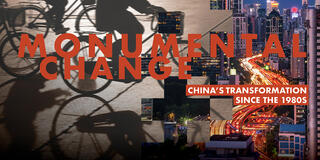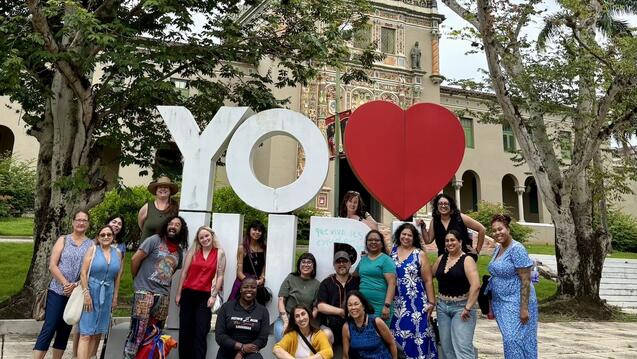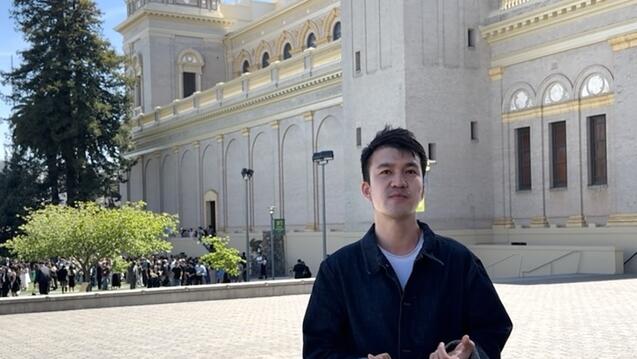Waking Up in China to Find Monumental Change

Imagine if you fell into a coma during the Mao Zedong years and woke up in Deng Xiaoping’s era or today’s China under Xi Jinping. Would you recognize the China in which you woke up? As the keynote speaker for the USF Center for Asia Pacific Studies’ fall conference, “Monumental Change: China’s Transformation Since the 1980s,” Jeffrey Wasserstrom (UC Irvine), encouraged people to envision how China’s “rapid surge” towards modernization has vastly altered nearly every aspect of life in today’s China. Speaking to a capacity audience of USF students, faculty, and staff and members of the Bay Area community, Wasserstrom’s engaging presentation set the tone for a stimulating discussion of China’s monumental change. On Nov. 15-16, 2017, the Center hosted Wasserstrom along with leading scholars from Asia, Europe and the United States to share their latest research and discuss how China’s economic modernization since the 1980s has affected Chinese society.
Over the course of the last two decades, China’s landscape has changed dramatically. Speakers illustrated how the story of China’s shifting rural landscape is one of land dispossession, the relocation of rural people, and the transformation of agricultural land into large scale urban developments. Scholars discussed recent and ongoing environmental degradation alongside current activism and calls for balancing growth with environmental protection. China’s rapid urbanization has created models for megablock cities and stimulated design discourse about sustainability and future urban development of the planet.
China’s policies since the 1980s have reshaped families and communities, exposing complexities and contradictions as practices are constantly reworked. Despite restrictions on the hukou (household registration) quota for major cities, the drive towards urbanization has continued unabated. While the system has adapted, it continues to impact citizen’s daily lives. In the religious realm, the ways people in contemporary China engage with religions have become focused on the individual and self-cultivation through religious practices. At the family level, one study finds that traditional patriarchal practices continue to accord authority to the male head of household, proscribing other members of the family to performing their assigned gender role.
In terms of economic and social changes, speakers demonstrated how Chinese mom and pop shops became drivers of social change during the 1980s. While mass protests rose sharply between 1993 and 2011, the Chinese Communist Party was able to to maintain a moral high ground while lower-level state officials and local officials became the targets of discontent. The conference ended with an exploration of how use of the internet and social media have exploded from 1987 when the first email in China was sent, to 2017 when China counted 751 million internet users online. Aware of the importance and influence of social media, Chinese leaders are now using media to connect directly with the people.
Overall, the conference revealed that economic growth has stimulated change that continues to reverberate throughout Chinese society. As the presentations revealed, China has undergone monumental change in the areas of urbanization and the environment, gender and the family, and business and communications.
The complete agenda of the conference included the following speakers and papers:
Monumental Change: China’s Transformation Since the 1980s
Nov. 14–15, 2017
University of San Francisco, Center for Asia Pacific Studies
Keynote Address: China in 1987 and in 2017: Modernization and its Discontents
Jeffrey Wasserstrom, Chancellor's Professor of History, University of California, Irvine
Session 1: Shifting Rural & Urban Landscapes
Discussant: Lanchih Po, Adjunct Associate Professor, East Asian Languages and Cultures, University of California, Berkeley
- A Northeast Borderland Perspective on Post-Mao Transformations in the Environment
Martin Fromm, Assistant Professor, History and Political Science, Worcester State University - Megablock Urbanism: The Spatial Instrument of Large-scale Development in China
Jeffrey Johnson, Director, School of Architecture, University of Kentucky - The Land of Monumental Change: Urbanization and Rural Dispossession in Contemporary China
Jia-Ching Chen, Assistant Professor, Department of Global Studies, UC Santa Barbara
Session 2: Reshaping Families and Communities
Discussant: Li Zhang, Professor of Anthropology, University of California at Davis
- China’s Hukou (household registration) System Since the 1980s
Fei-Ling (Philip) Wang, Professor, Sam Nunn School of International Affairs, Georgia Tech (via video conference) - Religious Change and Social Change in Contemporary China
Adam Yuet Chau, Senior Lecturer, Chinese Studies, University of Cambridge - Remaking Patriarchy in Urban China: Views from a Disadvantaged Beijing Neighborhood
Harriet Evans, Professor, Social Sciences and Humanities, University of Westminster
Session 3: Responding to Economic & Social Changes
Discussant: Peter Lorentzen, Assistant Professor, Department of Economics, USF
- Mom-and-Pop Shops as a Driver of Change in China during the 1980s
Karl Gerth, Hwei-Chih and Julia Hsiu Chair in Chinese Studies and Professor of History, University of California, San Diego - Rising Social Conflict, Resilient Communist Party-State: Interpreting the Chinese Puzzle
Alvin So, Chair Professor, Social Science, Hong Kong University of Technology and Science - A Double-edged Sword: Party Leaders versus Netizens in an Explosive Internet and Social Media Age in China, 1987 to present*
Tuen-Yu Lau, Founding Director, Digital Media Master’s Program, University of Washington, *co-authored with Pauline Luk, Ph.D. candidate, communications & new media, National University of Singapore


